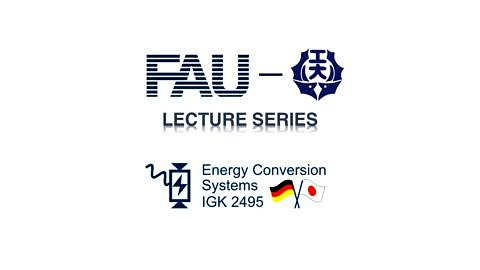Starting this FAU winter semester 20/21, the IRTG offers master courses introducing material classes and modeling techniques!
As part of the collaboration between FAU and Nagoya Institute of Technology, Japan, the IRTG will offer three new interdisciplinary graduate level lectures consisting of two courses held by both a Japanese and a German Professor starting from November 2020.
This FAU-NITech Lecture Series will provide doctoral researchers and master students with an excellent overview of the materials and simulation techniques at the heart of the IRTG. Each module is compatible with the masters courses: EEI, ET, MWS, NT, MAP, WING, MB, ME, CE (TechFak) and Chemistry (NatFak). The course material will be offered through studon, and consultation hours via Zoom or Teams. Registration through studon or meincampus.
Introduction to atomistic and mesoscale modeling (GRK2495-Lecture)
This 5 ECTS module consists of two complementary lectures, which shall help you better understand the continuum modelling and simulation of electro-mechanics, and explains about the computer simulation methodologies at atomistic scales for analyzing and predicting various physical properties of materials. Both lectures will be available digitally on studon.
- Electro-Mechanical-Modeling (EMM) – Prof. Steinmann
EMM shall help you to better understand the continuum modelling and simulation of electro-mechanics.
- Simulation for Nano-Technology – Prof. Ogata
This lecture explains computer simulation methodologies at atomistic scales for analyzing and predicting various physical properties of materials.
Introduction to lead-free perovskite ferroelectrics for electro-mechanical systems (GRK2495-Lecture)
This 5 ECTS module consists of two complementary lectures, giving participants an introduction to ferroelectric material properties, measurement techniques, and applications as well as discussing the recent development of novel lead-free ferroelectric systems. Both lectures will be available digitally.
- Electromechanical Properties of Ferroelectrics – Prof. Webber
The primary goal of this lecture is to provide an introduction to the concepts and phenomena that make ferroelectrics an exciting and state-of-the-art class of materials. - Piezoelectric Properties of Lead-Free Ferroelectrics – Prof. Kakimoto
This course provides basic and latest information on the functional properties of ferroelectric materials, for which the orientation of spontaneous polarization changes with electric field, and also gives examples of their commercial applications.
Materials and devices for opto-electric and energy technologies (GRK2495-Lecture) 5ECTS
This 5 ECTS module consists of two complementary lectures, discussing novel research, concepts, and developments in photovoltaics; analyzing the current trends in relation to different materials, namely perovskites, organic materials, light-absorbing dyes, quantum dots, and tandem / multi-junction solar cells offer; and introducing the theory and practice of electronic materials characterization and analysis based on the case of semiconductors. Both lectures will be available digitally.
- Next Generation Solar Energy (NGSE5) – Prof. Brabec:
 The conference concept of the 5th International Conference on Next Generation Solar Energy (NGSE5), held from 7th – 9th of December 2020, introduces the topic “Next Generation Solar Energy” with a series of 50 min tutorials. A series of 15 min long impulse lectures on current results and trends will complement the concept. The conference offers an excellent opportunity to learn about latest developments and current projects in the field of organic and perovskite photovoltaic technology.
The conference concept of the 5th International Conference on Next Generation Solar Energy (NGSE5), held from 7th – 9th of December 2020, introduces the topic “Next Generation Solar Energy” with a series of 50 min tutorials. A series of 15 min long impulse lectures on current results and trends will complement the concept. The conference offers an excellent opportunity to learn about latest developments and current projects in the field of organic and perovskite photovoltaic technology. - Electronic Materials Analysis – Prof. Kato
This lecture introduces theory and practice of electronic materials characterization and analysis based on the case of semiconductors.
Any questions to: Julia Berger
